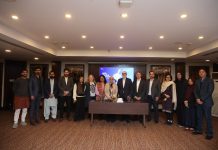ISLAMABAD, MAR 19 (DNA) – The minorities of Pakistan love the country as much as the Muslim majority does, and they have the equal stake in the vision of Pakistan, said the speakers during the second day of a series of webinars entitled, “Nurturing Peaceful, Respectful and Inclusive Societies in Pakistan: Seerat Counters Hate Speech through Decisive Action”. Representatives of different Pakistani minorities, including Christians, Hindus, Sikhs, Buddhists, Kalashas, Parsi and Baha’i communities addressed the webinars, being jointly organised by the Higher Education Commission (HEC), Pakistan and the United Nations Office on Genocide Prevention and the Responsibility to Protect.
Dr. Amineh Hoti, former Project Director Seerat Chairs, HEC, moderated the webinars. She stressed the need for promoting empathy and respect for each other. She said the majority must include and respect the minorities, adding that the majority and minorities must joint hands to fight hate speech and all the negative and discriminative attitudes and behaviours to marginalise specific groups of people. She emphasised measures to ensure justice and inclusivity in the society of Pakistan.
Dr. Simona Cruciani, Political Affairs Officer at the UN Office on Genocide Prevention, shared the definition of hate speech, saying that there was no international legal definition of hate speech, and the characterization of what is ‘hateful’ is controversial and disputed. In the context of the UN document, the UN Strategy and Plan of Action on Hate Speech, the term hate speech is understood as any kind of communication in speech, writing or behaviour, that attacks or uses pejorative or discriminatory language with reference to a person or a group on the basis of who they are, in other words, based on their religion, ethnicity, nationality, race, colour, descent, gender or other identity factor. This is often rooted in, and generates intolerance and hatred and, in certain contexts, can be demeaning and divisive.
She reiterated that the UN was committed to countering hate speech globally with the cooperation of its partners. She said that the UN Secretary-General was very much concerned about the ‘tsunami of hate speech’, especially the online trends of spreading hatred during the pandemic. She said that the UN was struggling to foster an environment of tolerance towards diversity, social cohesion, and dialogue wherein freedom of opinion and human rights were honoured. The UN was closely working with the victim groups to cope with stigmatization, discrimination, and targeting of specific groups, she revealed.
In his remarks, Dr. Safdar Ali Shah said that Pakistan was a land of diversity, as its people accepted, respected, and embraced the existence of diverse religious and ethnic communities. “The soil of Pakistan inherited diversity.” He shed light on the ancient civilizations homed by the land of Pakistan, including Mehr Garh, Indus Valley Civilization, and Gandhara Civilization. He said that Sikhism flourished in the presence of Islam and Hinduism in the united India, while four relics of Buddha were also found in the soil of Pakistan. Regarding Taxila, a significant archaeological city in Punjab, he said that the city witnessed many cultures prospering and expanding. He said that Sufi saints of the land promoted the philosophy of humanism.
Addressing the webinar, Mr. Isphanyar Bhandara, a former Member of Parliament, who represented the Parsi community of Pakistan, said that the minorities of Pakistan decided at the time of independence in 1947 to become Pakistanis by choice. He said that the minorities had equal stake in Pakistan and they equally loved the country. He said that t Muhammad Ali Jinnah, firmly believed in religious tolerance, diversity, and acceptance of all religions.
Mr. Bhandara said there were some people, who had gone astray and fueled discrimination between the majority and minorities, yet it was “never too late” for them rectify. He underlined a few factors, including the geopolitical situation of the region and deficiencies in the school education system, that caused the segregation and discrimination. He emphasised that the Government must take practical measures to create awareness about the importance of minorities and their contribution to the development of Pakistan. He proposed to the Government to increase job quota, in addition to increasing seats in the legislature, for the minorities. He stressed the need for naming roads and highways after minority leaders to acknowledge their services to the country. The teachers must be trained and the curricula must be reviewed to promote religious tolerance and respect for minorities, he emphasised. He noted that media had a very powerful role in the society, so the media houses should be mandated to give some time to educate about people about various religions, portraying positive picture of the minority groups. “I firmly believe that protecting and accepting minorities will help project a good of image of Pakistan.”
Representing the Christians, Dr. Sara Safdar, former Dean at Peshawar University, highlighted the role of Christian community in the development of Pakistan, the rights of minorities, and the challenges being faced by the minorities. She said the Christian community had a great contribution to the foundation of Pakistan, as it fully supported Mr. Jinnah at the time of his struggle for an independent homeland. “Special attention must be paid to address the gaps in protection of minorities’ rights.” She added that steps must be taken to facilitate dialogues between the Government and minorities so that the minorities were enabled to express themselves. She also underlined the importance of unbiased media reporting to promote interfaith harmony.
Major Harchan Singh from the Sikh community shared a presentation on the philosophy of Guru Nanak Dev Ji, the fostering of Sikhism in Pakistan, his love for Pakistan, and the Kartarpur Corridor as a bridge of peace. He said that the Guru of Sikhism was strongly against all the artificially created divisions and discrimination. He quoted the Guru as saying: “caste of a person is based on what he does.”
He said that a significant part of the Sikh history was linked to places located in Pakistan, including historical Gurdwaras, associated with different events of Guru Nanak’s life. He said that there were around 20,000 Sikhs scattered across Pakistan. He said that he inherited patriotism and nationalism from his father. He also highlighted the importance of opening the Kartarpur Corridor to the Sikhs living in India who could now easily offer pilgrimage to Nankana Sahib, the birthplace of Baba Guru Nanak.
Dr. Seema Nake, who represented Baha’i community, a staunch advocate of interfaith harmony, said that one must treat others the way one wanted oneself to be treated. She said that Pakistani youth had great abilities and they could play a positive role in combatting hate speech and discriminative segregation and isolation. She emphasised that the well-being of mankind was unattainable until unity was firmly established.
She said that the human beings were duty bound to build the essential relationship that were binding them as one family. She hoped that the discussions in the webinars would find expression in action. She also presented a few recommendations to make the HEC-UN efforts more productive, like steps to engage all the concerned, including youth, in a dialogue process for the cause. “We have to reflect on moral character development and spiritual empowerment of every child in Pakistan.” She asserted that diversity could become a means for social development in Pakistan.
Gul Kalasha, a representative of Kalasha community, depicted the history of Kalash, and said that the community had been living in Kalash, Chirtal, for the past 3000 years. She said that the majority of Muslims living over there loved and respected them. “We can perform our rituals and follow our customs and traditions in peace and harmony.” She said that hate speech never eliminated hate, rather love and compassion brought peace and harmony in the region. She stressed the need for teaching of tolerance towards religions from schools. “The madrassahs, schools and media can play an important role to eliminating hatred in the society,” she concluded, while laying emphasis on practical steps.
Pushpa Kumari, a representative of Hindu community, said that the white colour in the Pakistani flag depicted the diversity and the rights of minorities. She said that the Hindus celebrated Holi, Diwali, and Eid, together with their country fellows without any hurdles. She urged that the people must be sensitised about the basic human rights and the constitutional rights through curricula. She said that the customs and cultures of diverse communities needed to be promoted, as this would help promoting peaceful coexistence. “We have to show the world that the Pakistanis, whichever religion and ethnicity they belong to, are a one nation.”
A Buddhist by religion, Rajkumari Troya Roy Khisa, highlighted salient aspects of Buddhism, saying that non-violence was the highest moral virtue. She said that the Government of Pakistan was always supportive of Buddhist tourism, adding that the Buddhist sites reflected the rich cultural heritage of Pakistan. She said that Buddhism preached its followers to avoid creating sufferings and problems for others. She affirmed that everyone was responsible for his or her deeds, as every action brought results. “Let’s try to live in harmony and help humanity to live together.”
The series of webinars aim at encouraging peaceful, inclusive, and empathetic communities in Pakistan through tools like active and continuous intersectional participations, dialogue, and collaboration. It is linked to the implementation of the Plan of Action for religious leaders and actors to prevent incitement to violence that could lead to atrocity crimes and the UN Strategy and Plan of Action on Hate Speech. It also aims to contribute to achieving the Sustainable Development Goals (SDGs), in particular SDG16 on building peaceful, inclusive and just societies.=DNA
==========================

















